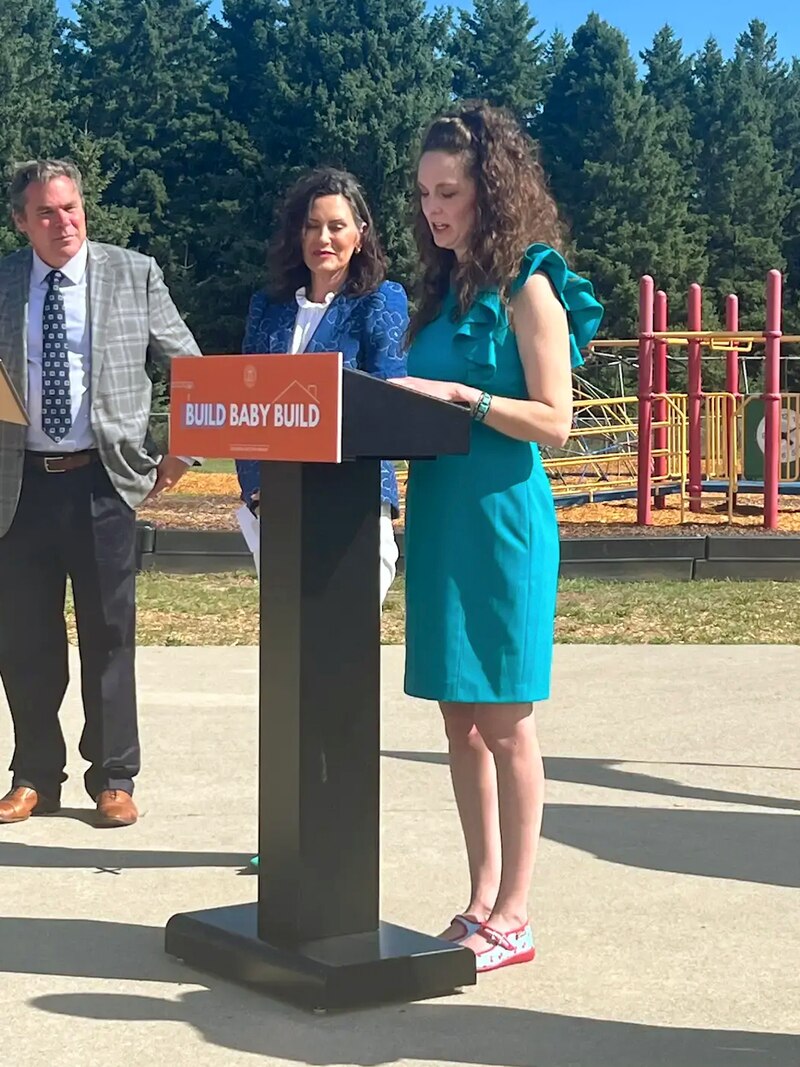Sign up for Chalkbeat Detroit’s free newsletter to keep up with the city’s public school system and Michigan education policy.
Chandra Fles, a behavior interventionist in Traverse City Public Schools, lived out of a tent with her dog for three months after being evicted from the home she had rented for years.
Fles looked for another home, but couldn’t find one she could afford – and was considering quitting her job at Cherry Knoll Elementary School to move somewhere else or change careers.
Luckily, just before the start of the 2022-23 school year, she found a new rental close to her budget. Still, it was $300 a month more than what she was accustomed to paying. She had to pinch pennies to make it work.
Fles’ struggle is a common one for educators in the scenic tourism hotspot of northwest Michigan, where housing stock is scarce and pricey. Every year, teachers who are offered jobs in the region rescind their acceptances because they can’t find a place to live. School leaders say the housing landscape makes it difficult to fill longstanding vacancies amid the ongoing teacher shortage.

So lawmakers and school officials in the region decided to try a creative approach to chipping away at the problem: building subsidized educator housing. The project will be the first of its kind in Michigan.
Their goal is to ultimately build around 144 units of duplex-style one- and two-bedroom apartments on land owned by Traverse City Area Public Schools next to Blair Elementary School, which is about 10 miles south of Traverse City.
“The reality is, our largest school district had 25 retirements last year,” said Nick Ceglarek, superintendent of the intermediate school district Northwest Education Service Center. “Educators fresh out of college really cannot afford to get access to a home, either by renting or buying.”
The district, which enrolled nearly 9,000 students in the 2023-34 school year, employed 394 teachers and around 1,500 total staff that year.
Ceglarek said the district and other schools in the area will soon see many more retirements in the coming years, which will exacerbate the existing need for more educators.
The average starting teacher salary in Traverse City Area Public Schools is around $44,000.
The median rent in Grand Traverse County in 2022 ranged from $1,400 for a one-bedroom unit to $1,970 for a three-bedroom, according to the most recently available report by the nonprofit Housing North. The median home price in Grand Traverse County was $350,000.
While the details are still being decided, Ceglarek said he anticipates rent for the new educator may be between $1,300 and $1,600. The final amounts will be based on area median income, he added.
The project’s goal is not only to make housing more affordable for educators, but to also create more available units in a place where any vacancies are hard to find. Many of the homes in the region are used solely as vacation rentals.
Rental vacancies in 10 northwest Michigan counties are scarce – at about .7%, according to Housing North. A healthy vacancy rate is between 5 and 8%, according to real estate market analysis firm Bowen National Research.
More than 31,000 additional homes are needed in the region to meet the community’s needs, Housing North estimates.
How is northwest Michigan aiming to ease the problem?
The plan to build subsidized educator housing began when a group of school leaders in the area came together over a year ago to brainstorm ideas for attracting and retaining more teachers.
They recently formed the Grand Traverse Housing for Educators to serve as the entity to oversee the project.
The consortium includes Northwest Educator Services, Traverse City Area Public Schools, Grand Traverse Area Catholic Schools, and Interlochen Center for the Arts.
To get the initiative started, lawmakers allocated $5 million in this year’s state school budget. The first phase of the project, which could produce 60 to 72 housing units, will cost an estimated $12 million.
Ceglarek said the group is applying for additional grants from the Michigan State Housing Development Authority.
The project is still in its early stages, with tentative plans to break ground in the next year and half, said Ceglarek.
The next step will be for the district to appraise the land and sell it to build out the project.
“If we were able to wave a magic wand and have all the funding we need, the ideal goal would be for people to be able to move in in fall 2026,” said Ceglarek. “We are encouraged and hopefully we have the momentum to move toward that direction.”
Who will qualify for the future housing?
Any K-12 educator in the region who makes 40% to 80% of the region’s median income will qualify to apply for housing.
The median household income in the region was around $77,000 in 2023, according to U.S. Census data.
In addition to teachers, eligible applicants include all school support staff, such as food service workers, bus drivers, classroom aides, and custodians.
Educators from any K-12 school in the region, whether public or private, are also eligible and
Ceglarek said applicants will likely be selected on a first-come, first-served basis.
The project’s likely target will be for around 20% of the tenants to be support staff and around 80% to be staff members early in their careers, said Ceglarek.
Will this be a model for other communities?
While the project will be Michigan’s first, other states have already embraced affordable educator housing.
In California, legislators are pushing districts to make their vacant property into teacher housing, while in Colorado, a district built housing on land they received from developers in lieu of school impact fees.
A Kansas City nonprofit is building a “teacher village” that rents duplexes to educators for a fraction of the market rate.
Rep. Betsy Coffia, a Democrat from Traverse City who helped secure the northwest Michigan project’s initial funding, said it’s an “innovative” way to approach a problem that spans wider than the education system.
The lack of available and affordable housing in her district impacts every sector of its workforce, she said.
“I don’t think the end of the road needs to be a company town situation where your boss owns your housing,” said Coffia. “I think the bigger approach should include looking at how restrictive zoning keeps us from building the kinds of housing we need.”
The housing challenges in her district are personal to Coffia. When she was a special education assistant in the mid-2000s, she also struggled to pay rent.
“I think people who are renting their property have to take a look at what kind of a community they want to live in,” said Coffia. “The amenities we enjoy are directly tied to the workers we are not able to attract here.”
As a former educator, Coffia also saw many of her peers leave the public school system due to low pay.
The teacher shortage won’t be fixed with more affordable housing options alone, she said.
“At the state level, we have to give funding to local districts to give teachers the raises they deserve,” Coffia said. “We have to make it an attractive profession again.”
Fles, the Cherry Knoll behavior interventionist who also serves as president of the Traverse City Education Association, said pay is the root of the teacher shortage.
“A teacher with a master’s degree and 10 years in the district shouldn’t face having to live out of a tent,” she said.
Hannah Dellinger covers K-12 education and state education policy for Chalkbeat Detroit. You can reach her at hdellinger@chalkbeat.org.






